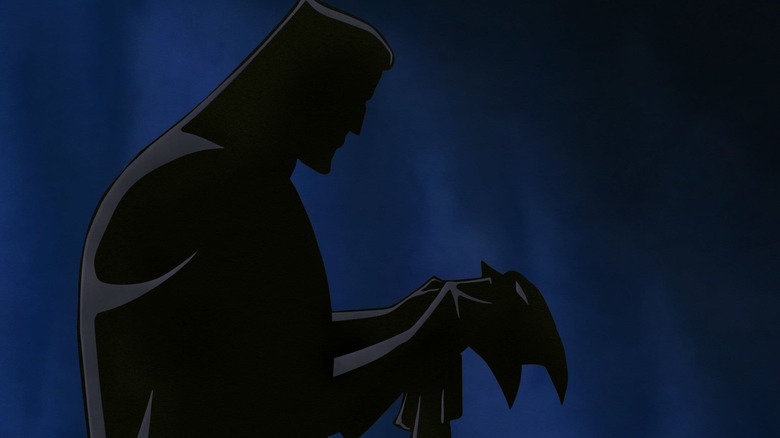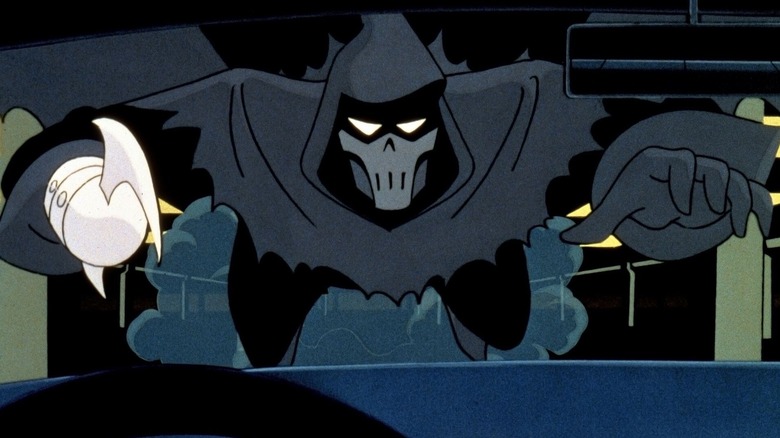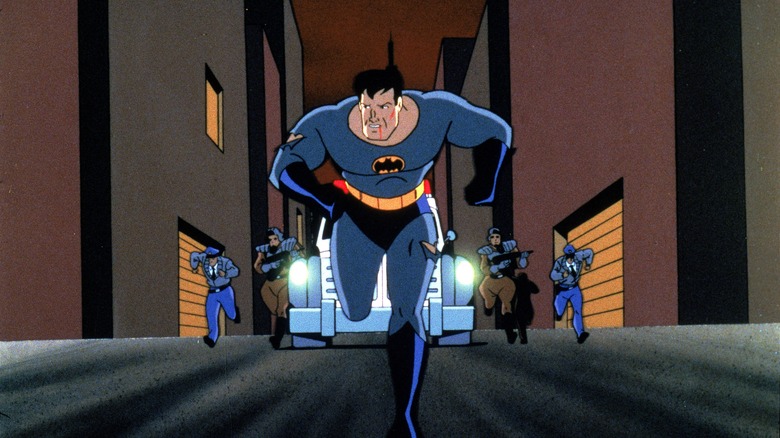Bruce Timm Wasn't Satisfied With His Work On Batman: Mask Of The Phantasm
I love a good Batman movie as much as the next person, but one thing that's always bugged me is how often Bruce Wayne is treated as a bit of a cipher in his own story. Screenwriters and directors are all too eager to get to the more entertaining business of the supervillains, repeatedly giving us the hoary old imagery of his parents' murder (alleyway, sadistic killer, scattered pearls) and the billionaire moping around his mansion before we get to the fun stuff.
That flaw is comprehensively addressed in "Batman: Mask of the Phantasm," the 1993 theatrical release originating from the Emmy-Award-winning animated TV series. To date, it is the only Batman film to fully invest in Bruce Wayne and his shadowy alter ego as a character just as interesting as Gotham City's colorful gallery of crooks.
The stylized animation gives us a hunky Bruce Wayne who literally puts the square jaw into the term "square-jawed hero," but this version of the troubled millionaire playboy is far more nuanced than his live-action counterparts. A large portion of the film's trim running time is devoted to exploring him as a real three-dimensional character, aided by superb voice work from Kevin Conroy who finds subtlety and surprising levels of self-doubt and vulnerability behind his conflicted quest for justice.
Clocking in at just 78 minutes, "Mask of the Phantom" packs in a remarkable amount of incident, merging the familiar beats of Batman's origin story with a tragic romance, noir-ish gangland mystery, and a satisfying slant on the confrontation with his arch-enemy Joker, played with fiendish glee by Mark Hamill. Yet for all its strengths, Bruce Timm, creator of the animated series and co-director of this feature-length adventure, still wasn't totally happy with it.
So what happens in Batman: Mask of the Phantasm again?
In the present day, Batman (Kevin Conroy) crashes a meeting of Gotham City crime bosses cutting a deal for a stash of counterfeit money. During the ensuing punch-up, mobster Chuckie Sol (Dick Miller) escapes, only to find himself menaced by a sinister cloaked figure, the Phantasm. Sol is killed and the blame falls on Batman, making the city's officials vow to bring him to justice.
In a flashback, young Bruce Wayne (Conroy) meets cute at the cemetery with Andrea Beaumont (Dana Delany), who is visiting her mother's grave. They bond over their lost parents and quickly fall in love, but happiness eludes them just as fast. Andrea's father is in debt to the mob and decides to skip town to save their lives, forcing her to break off her engagement with Wayne. Meanwhile, he is torn between the promise of vengeance he made to his deceased parents and finding happiness with Andrea.
Back in the present, Batman bumps into Andrea again as the Phantasm murders another gangster, accidentally revealing his true identity to her. With two mob bosses down, ailing crimelord Sal Valestra (Abe Vigoda) fears that he is next and turns to the Joker for protection.
If there is something a bit "Scooby-Doo" about the Phantasm initially, that is dispelled by a final reveal that delivers a strong emotional payoff during the usual showdown between Batman and the Joker. The relationship between Bruce Wayne and Andrea, founded on mutual trauma, gives their romance far more texture than the haunted billionaire's usual big-screen love interests. It's a pretty heavy storyline for a movie aimed at a young audience, but a rewarding one that reveals the cursed path Wayne has chosen by becoming the Dark Knight.
Why Bruce Timm finds Mask of the Phantasm cringeworthy
"Batman: Mask of the Phantasm" may have become a firm fan favorite, but the rushed production left its creator dissatisfied with the final result. After the success of the animated series, it was originally intended as a one-off special for TV before the executives at Warner Bros decided on a theatrical release. This meant Bruce Timm and his team only had eight months to put the film together on a limited budget of $6 million; by contrast, Disney's "Aladdin," released the year before, cost $28 million and took 18 months to animate. Timm told Empire magazine (via CBR):
"We got the word that [the studio] officially wanted to make it a theatrical release while we were literally handing out the storyboards to the animators. It had all been formatted for the old-school TV ratio, which was practically a square. It was like, 'What the heck are we going to do?' ... When I see it, I just cringe. It's, like, 90 percent there. I just wish I had that last 10 percent!"
The finished film had a rocky start to life, failing to make its money back at the box office as it went up against "Tombstone" for a Christmas release and suffering from "Mrs. Doubtfire" and "The Pelican Brief" still going strong in theaters. Time has been very kind to the animated feature over the 30 years since that initial disappointment, now regarded by fans as the most compelling version of The Dark Knight's origin story and ranking high on lists of the best Batman movies ever made. Not bad for a film only 90 percent of what Timm wanted.


